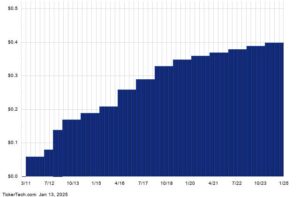Investing.com – The “post-election script” in markets following Trump’s victory in the November ballot somewhat resembled movements in the wake of his prior win in 2016, according to analysts at BCA Research.
“[T]he moves following this election were also sizable and sharp,” the analysts wrote, flagging big moves in the price of and shares in banks in particular.
Trump campaigned on a largely pro-cryptocurrency message, fueling hopes that his administration would embrace the industry after years of scrutiny under current President Joe Biden. Investors are also looking at banks as potential beneficiaries of more pro-business policies under Trump, who has vowed to pursue looser regulations and deliver tax breaks.
But since the beginning of Trump’s first term in the White House, the economic environment “has changed significantly”, the BCA Research analysts argued.
In 2016, inflation had routinely fallen short of the Federal Reserve’s stated 2% target for several years, “feeding an accumulated price-level deficit”, they said. However, pandemic-era disruptions have since “decisively flipped deficit to surfeit”, while the Fed and the public have “little to no tolerance for above-target inflation”, the analysts added.
Trump’s current plans to impose stiff tariffs, slash taxes, and carry out mass deportations all threaten to stoke inflationary pressures as well, they said. Uncertainty around the impact of these proposals has recently led Fed officials to dial back their interest rate expectations, with members now calling for a more “careful” approach to future possible cuts to borrowing costs.
Meanwhile, Labor Department data last week showed that nonfarm payrolls came in well above analysts’ expectations and the unemployment rate decelerated slightly to 4.1% from 4.2%. The strong reading has exacerabted doubts around how many cuts, if any, the Fed could roll out this year, driving up government bond yields and weighing on equities.
Indeed, the , which initially rallied after Trump’s victory, is now down by 0.7% since Nov. 5. The small-cap-focused index has also dropped into correction territory, down by 10% versus a recent closing high notched in late November.
Still, the analysts argued that equity multiples remain “demanding” and credit spreads leave risk assets “vulnerable to modest disappointments.” As a result, they are maintaining “defensive positioning”, they said.
Read the full article here
















